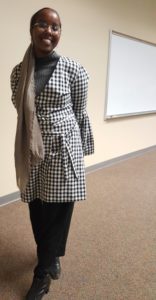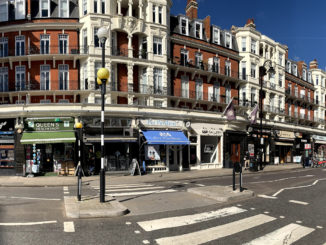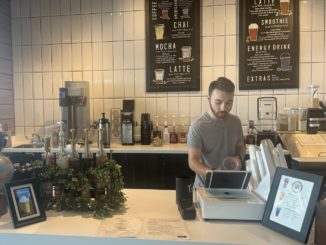
On Feb. 11, Saida Dahir told the DMACC Urban audience that speaking in front of crowds is still hard and she gets scared sometimes. This is coming from someone who spoke in front of a reported crowd of 8,000 people, the Congress in Washington D.C., and recorded a spoken word album entitled, “The Walking Stereotype.” The YouTube video of her speaking at the 2018 March for Our Lives protest in Salt Lake City garnered over 15,000 views.

She said, “I knew that I had a message. I had a story to share. I was going to utilize my voice that I have the privilege to be using to go up there and say what I thought.” Dahir was invited by Julie Simanski of DMACC’s Diversity Commission because it aligns with their goal to provide educational opportunities, activities, and special events that “promote diversity.”
Dahir hasn’t always been writing political poetry. At the age of seven, she wrote some rap verses for her brother, but she said that they were rejected as “trash.” She tried singing but realized that she couldn’t do that either. She thought her poetry would stay as a hobby for herself, but she didn’t stay unnoticed. One of her teachers said that she wouldn’t get an “A” in his class unless she spoke one of her poems in the seventh grade talent show and so she did.
She said, “I read one of my crappy love poems, didn’t expect anything to come of it, but everyone loved it! A couple of people pulled me aside and said, ‘I really, really like your poem.’ And I don’t know, that feeling, that connectivity between what you pour your heart into and the audience really connecting, it was incredible! So I’m just like, ‘Maybe I’m good at this.’”
In the 2017 Utah March for Refugees, she read her first political poem and letter to President Trump. It was in response to the Muslim Ban of 2017, which prohibited U.S. entry of people from seven Muslim-majority countries, including her native Somalia. She spoke up for refugee children like her and said, “They hear loud explosions again and again, but all these children are wishing for is paper and a pen.”
Dahir’s family left their homeland of Somalia when she was three years old. Her mother, a single mom of eight children, escaped to a refugee camp in Kenya. Dahir described the violence of refugee camps and said, “They aren’t incubators for success. Fifty percent of all refugees are under the age of 18. They are deadly environments.”
She said, “We had a redemption story. We got out after five years of patiently waiting. My family was finally granted refuge in the United States. It costs a lot of money.”
Dahir asked the audience to close their eyes and imagine the language they speak, the food they eat, their seat that they’re sitting in, and the family that they’ll go home to. Next, she prompted them to imagine a foreign place away from all of that. She said that being a refugee is a mix of emotions including joy and happiness—there is more than one narrative.
She quoted another Somali-British poet, Warsan Shire: “You have to understand / that no one puts their children in a boat / unless the water is safer than land.”
She said that mainstream media isn’t talking about the refugee crisis that is happening in every corner of the world. The United Nations Refugee Agency reported that 70.8 million people around the world have been forced to leave their homes including 25.9 million refugees. Over 50 percent are less than 18 years old—children. At the same time, the Muslim Ban has increased to an additional six countries in 2020.
Dahir said, “We’re staring at a human rights catastrophe right in the face and time and time again, we refuse to acknowledge it.”
Dahir asked audience members, “To find what you’re passionate about and then do something about it. I’m a big believer that changes come with one person. Change can happen if you say it wants to be done…Don’t let our legacy be one of dismissal. Don’t let our legacy be one where politicians can do whatever they want.”
DMACC’s Diversity Commission will hold more events like this throughout the spring semester: Open the “DMACC Daily” email and scroll down to “Urban Campus News” for opportunities on campus.




Be the first to comment